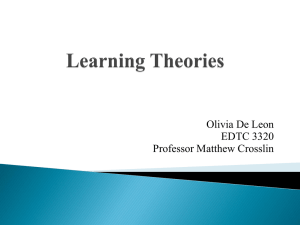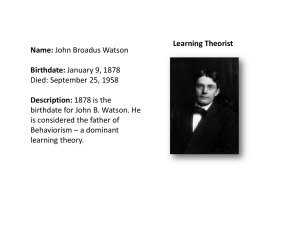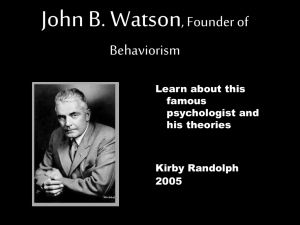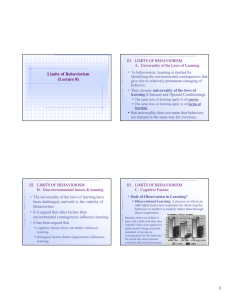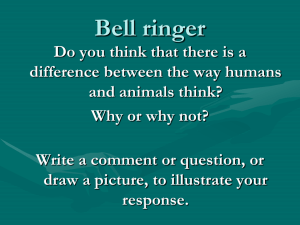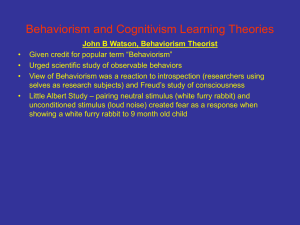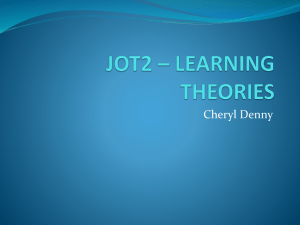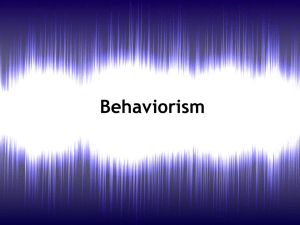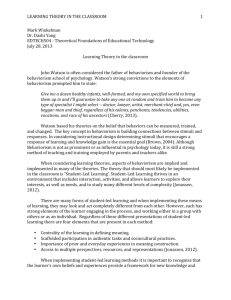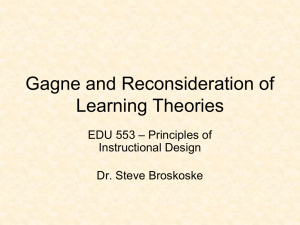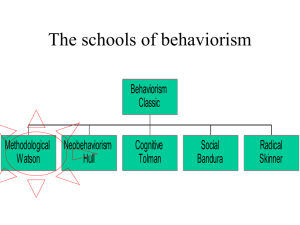learning theories cognitive vs behavioral
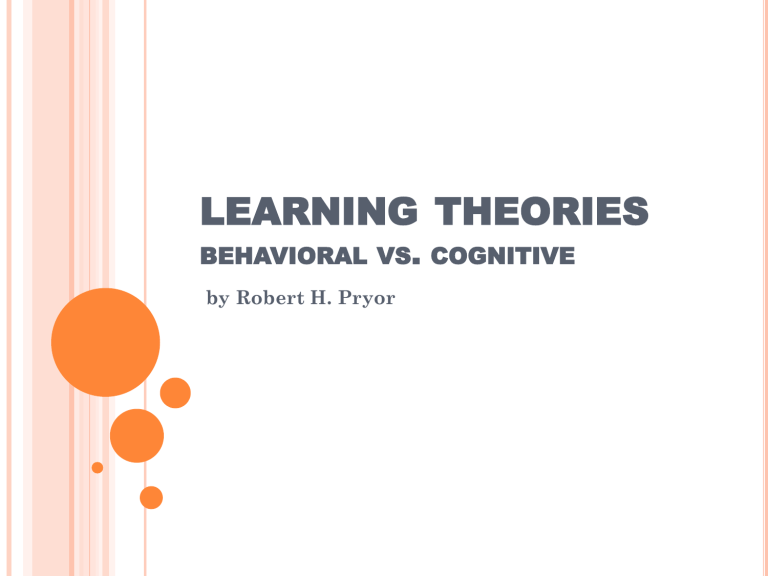
LEARNING THEORIES
BEHAVIORAL VS . COGNITIVE by Robert H. Pryor
BEHAVIORISM
Behaviorism is a theory of learning that believes all behavior is learned by conditioning. The theory does not count for the learner’s internal mental state but focuses on their interaction with their environment.
JOHN B. WATSON
Behavioral Theorist (1878 – 1958)
John B. Watson was an
American psychologist that has often been called the “father of behaviorism.” He was a major advocate for behaviorism and believed that anyone could be conditioned.
JOHN B. WATSON
Education and Career
Furman University – Masters degree
University of Chicago – Doctorate degree
Assistant and Instructor at University of
Chicago
Professor – John Hopkins University
Director of psychological laboratory – JHU
Executive - J. Walter Advertising Agency
JOHN B. WATSON
Popular Experiment
One of John Watson’s most popular and now controversial experiments was the “Little Albert” experiment. He took a nine month old baby and would show him a white rat and then would make a loud noise by hitting a metal pipe with a hammer. The baby soon became frightened and would cry when he would simply see the white rat even without
Watson making any noise at all.
BEHAVIORISM in PRACTICE
Behaviorism in teaching and training can still be seen in practice today. Teachers will use rewards or punishment in order to get their students to behave in a certain manner. Adults can be trained by behaviorism as well. There are corporate training programs that will reward the learner if they get so many answers correct and if they miss too many questions they will be punished by having to retake the training or be denied certain privileges.
COGNITIVISM
Cognitive theory is the theory that a person’s mind is like a computer and it is to be understood in order to know how people learn.
You need to study the mind to understand how people think, solve problems, and store memories.
ROBERT MILLS GAGNE
Cognitive Theorist (1916 – 2002)
Robert M. Gagne was an American educational psychologist best known for creating the idea that different types of learning does exist and different instruction is needed for different outcomes.
ROBERT MILLS GAGNE
Education and Career
Yale University - A.B. degree 1937
Brown University – Ph.D. – 1940
Professor of psychology – Connecticut college for Women (1940 – 1949)
Professor – Penn Sate University (1945 – 1946)
Professor – Princeton University (1958 – 1962)
Professor – U.C. Berkeley (1966 – 1969)
Professor – Florida State University
Research Director for the Air Force
Consultant for the Department of Defense
ROBERT MILLS GAGNE
Popular work
Robert Gagne is well known for many of his written work but mostly for “The
Conditions of
Learning” in 1965.
It is from this work that he developed the eight kinds of
learning and the nine events of
instruction.
COGNITIVISM in PRACTICE
You can see the cognitive theory in use today in almost every educational setting. Online classes use the cognitive theory by allowing the learner to learn by using multimedia tools. I would also say they people are learning using the cognitive theory when they are simply socializing with friends on the internet using services like facebook or twitter..
IMPACT on ADULT EDUCATION
You can see the behavioral theory used in training courses for new employees at a job like Walmart.
New employees are taught the basics of how they must be on time for work each day or they will be punished. On the other hand if they do not miss any work over a certain period of time they will receive a reward of some kind (certificate, free meal, or money).
You can also see the cognitive theory being used in
Walmart’s computer based training where they use multimedia training that is different based on the skill level and experience of the employee.
WORKS CITED
Behaviorism. (n.d.). Retrieved June 24, 2011 from http://www.learning-theories.com/behaviorism.html
John B. Watson. (n.d.). Retrieved June 25, 2011 from http://www.lifecirclesinc.com/Learningtheories/behaviorism/Watson.html
Robert Mills Gagne. (n.d.). Retrieved June 25, 2011 from http://www.answers.com/topic/robert-mills-gagn
Brown, A., & Green, T. D. (2006). The Essentials of
Instructional Design. Upper Saddle River, NJ:
PEARSON.
